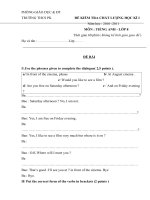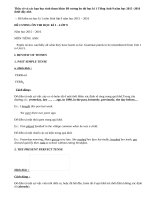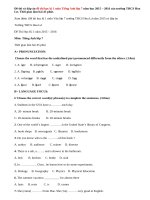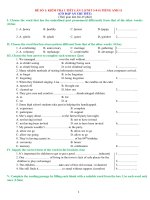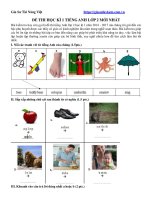ĐỀ THI HỌC KÌ 1 TIẾNG ANH 8 FRIENDS PLUS (ĐỀ SỐ 3)
Bạn đang xem bản rút gọn của tài liệu. Xem và tải ngay bản đầy đủ của tài liệu tại đây (550.64 KB, 17 trang )
<span class="text_page_counter">Trang 1</span><div class="page_container" data-page="1">
<b>Exercise 1. Which word has the underlined part pronounced differently from that of the others? </b>
<b>2. A. function </b> B. future C. question D. nature
<b>Exercise 2. Which word has a different stress pattern from that of the others? 3. A. decade </b> B. puzzle C. vintage D. collar
<b>4. A. apparently </b> B. generally C. obviously D. absolutely
<b>Exercise 3. Choose the answer (A, B, C or D) that best fits the space in each question. 5. I _______ work, walked to the beach and found a nice place to swim. </b>
A. finish B. finished C. was finishing D. used to finish
<b>6. We suddenly _______ an old school friend when we _______ in a café. </b>
A. saw / were sitting B. were seeing / sat
<b>7. Living in a flat is all right, but it has its limitations - _______, you don't have your own garden. </b>
A. for good B. for sale C. for all D. for instance
<b>8. Tourists can discover the underwater world by going ______. </b>
A. scuba-diving B. mountain climbing C. skydiving D. bungee jumping
<b>9. In 2005, Jack set off on an ______ journey which lasted for around 15 years. He travelled to many </b>
fascinating places around the world.
<b>10. That’s the shop ______ I bought my ski equipment. </b>
<b>11. We didn’t spend ______ money on Christmas presents. </b>
<b>12. I am OK, ______? </b>
A. am not I B. am I C. aren't I D. are I
<b>13. My parents ______ the house all day, so they are feeling tired now. </b>
A. cleaned B. will be cleaning C. have cleaned D. have been cleaning
<b>14. Would you rather ______ Cát Tiên National Park or a rainforest? </b>
A. explore B. to explore C. exploring D. explored
<i><b>15. Ann: What an attractive hair style you have got, Mary! – Mary:___________. </b></i>
A. Thank you very much. I am afraid B. You are telling a lie
<b>ĐỀ THI HỌC KÌ 1 – ĐỀ SỐ 3 MÔN: TIẾNG ANH 8 FRIENDS PLUS </b>
<b> BIÊN SOẠN: BAN CHUYÊN MÔN LOIGIAIHAY.COM </b>
</div><span class="text_page_counter">Trang 2</span><div class="page_container" data-page="2">C. Thank you for your compliment D. I don’t like your sayings
<i><b>16. Hoa: It’s time for lunch. - Nam: ___________ </b></i>
A. Oh good! B. One hour C. Half past twelve D. What is it?
<b>Exercise 4. Supply the correct form of the word given in each sentence. 17. Listen! Tom and Jerry are _______ having a quarrel. (APPARENT) </b>
<b>18. Located between Nepal and Tibet, Mount Everest has attracted many climbers, including highly </b>
experienced ______. (MOUNTAIN)
<b>19. It is thought that the very first placental mammals were tiny ______, but no fossil evidence of them remains. (INSECT) </b>
<b>20. The salt ______ as the water evaporates. (CRYSTAL) </b>
<b>Exercise 5. Read the following and decide if the following sentences are True or False. </b>
It is a common misconception that those who take part in extreme sports or look for an “adrenaline rush” are most likely to be young and male. This way of thinking makes extreme sports become viewed in a way that is inaccessible to “normal people”. In fact, participation in extreme activities is beneficial to humans. Participants from all sorts of extreme sports broaden their extraordinary sensory experience that is not usually available in everyday life. This is because their ability to see, here and feel are all heightened during their participation. For example, base jumpers often talk about an enhanced capacity to see every nook and cranny, shapes and sizes of the rock even though they are travelling at 200 mph. What’s more, there is clear evidence that most
<b>sensation-seekers develop positive relationships with the natural world and pro-environmental behaviors. </b>
During their participation in extreme sports, participants feel like they are merging with the environment which invariably turns into a feeling of being profoundly part of nature. This may be one reason why so many extreme sports athletes spend a great deal of energy and time protecting the natural environment and working hard to raise public awareness of its importance.
<b>21. Most people are under the impression that participants in extreme sports are young and male. 22. Participation in extreme sports does harm to human well-being. </b>
<b>23. Extreme sports participation is unlikely to be suitable for the general population. 24. Participants in adventure sports can experience the feeling of merging with nature. </b>
<b>Exercise 6. Choose the word (A, B, C or D) that best fits each blank space in the following passage. CUSTOMER REVIEWS </b>
<b>Wind-up radio: I bought it last week. As a green consumer, I love this idea because there is (25) ______ need </b>
for batteries. All you need is wind this radio up for one minute and you will listen for twenty minutes. Also, I
<b>find it easy to tune to the station I want to hear. However, the biggest (26) ______ is that its rubber cover easily wears (27) ______. The company should deal with it soon or customers will choose a better brand. Water-powered clock: If you like durable goods, this clock is a must-have item. I bought it eight years ago, but it still works. It just stopped (28) ______ last week. I emptied it, filled it with some tap water and shook it around a little. Then, it worked just like a new one. What impresses me is that the clock is made (29) ______ </b>
</div><span class="text_page_counter">Trang 3</span><div class="page_container" data-page="3"><b>recycled materials, so it’s a bit more expensive than a normal one. In my (30) ______, the price is acceptable </b>
and it’s a great gift for your best friends!
<b>26. A. destruction </b> B. advantage C. solution D. disadvantage
<b>28. A. doing </b> B. taking C. working D. bringing
<b>30. A. thought </b> B. view C. thinking D. vision
<b>Exercise 7. Rearrange the groups of words in a correct order to make complete sentences. 31. through the dunes / competitors have / of the desert. / In the challenge, / to run 250 kilometres </b>
_______________________________________________
<b>32. done? / What’s / journey / you’ve ever / the longest </b>
_______________________________________________
<b>Exercise 8. Rewrite each of the following sentences in another way so that it means almost the same as the sentence printed before it. </b>
<b>33. My uncle was a bus driver when he was young. </b>
<b>Exercise 9. Listen to a talk about online shopping and fill in each blank with a suitable word. 36. You can buy a product or ____________ online. </b>
<b>37. When shopping online, you visit a ____________ website. 38. Online shopping helps you save time and _____________. </b>
<b>39. If you return a product, you still must pay for the _____________. 40. Shopping online can make you become a _____________. </b>
<b>---THE END--- </b>
</div><span class="text_page_counter">Trang 4</span><div class="page_container" data-page="4">16. A 17. apparently 18. mountaineers 19. insects 20. crystallizes
36. service 37. seller's 38. money 39. shipping 40. shopaholic 31. In the challenge, competitors have to run 250 kilometres through the dunes of the desert.
32. What’s the longest journey you’ve ever done? 33. to be a bus driver when he was young.
34. used to be popular in the USA. 35. not rich enough to buy food.
<b>HƯỚNG DẪN GIẢI CHI TIẾT </b>
</div><span class="text_page_counter">Trang 5</span><div class="page_container" data-page="5">A. finish (hiện tại đơn) B. finished (quá khứ đơn)
C. was finishing (quá khứ tiếp diễn)
D. used to finish (used to V: diễn tả thói quen trong q khứ, bây giờ khơng cịn nữa)
<b>I finished work, walked to the beach and found a nice place to swim. </b>
<i>(Tôi làm việc xong, đi bộ ra bãi biển và tìm được một nơi tuyệt vời để bơi lội.) </i>
Đáp án: B.
<b>6. A </b>
<b>Kiến thức: Quá khứ đơn, quá khứ tiếp diễn Giải thích: </b>
Mệnh đề phía trước diễn tả một hành động xen vào => động từ chia quá khứ đơn; mệnh đề phía sau diễn tả một hành động kéo dài đang diễn ra => động từ chia quá khứ tiếp diễn. Cấu trúc “S1 + V-ed + O + when + S2 + was/were + V-ing”.
<b>We suddenly saw an old school friend when we were sitting in a café. </b>
<i>(Chúng tôi bất ngờ gặp lại một người bạn học cũ khi đang ngồi trong quán cà phê.) </i>
Đáp án: A.
</div><span class="text_page_counter">Trang 6</span><div class="page_container" data-page="6"><b>7. D </b>
<b>Kiến thức: Liên từ Giải thích: </b>
Mệnh đề phía sau đưa ra ví dụ cho vấn đề được nhắc đến ở mệnh đề phía trước => Vị trí cịn trống cần điền một liên từ mang nghĩa “ví dụ”.
<b>Living in a flat is all right, but it has its limitations - for instance, you don't have your own garden. </b>
<i>(Sống trong một căn hộ khá tốt, nhưng nó có những hạn chế - ví dụ, bạn khơng có khu vườn riêng.) </i>
D. bungee jumping: nhảy bungee
<b>Tourists can discover the underwater world by going scuba-diving. </b>
<i>(Du khách có thể khám phá thế giới dưới nước bằng cách lặn biển.) </i>
<b>In 2005, Jack set off on an epic journey which lasted for around 15 years. He travelled to many fascinating </b>
places around the world.
<i>(Năm 2005, Jack bắt đầu cuộc hành trình hồnh tráng kéo dài khoảng 15 năm. Anh ấy đã đi du lịch đến nhiều nơi thú vị trên khắp thế giới.) </i>
Đáp án: A.
<b>10. D </b>
<b>Kiến thức: Mệnh đề quan hệ Giải thích: </b>
Danh từ phía trước chỉ địa điểm => phía sau cần một đại từ quan hệ nơi chốn “where”. A. what: chỉ cái gì (cái gì)
B. when: chỉ thời gian (khi nào)
</div><span class="text_page_counter">Trang 7</span><div class="page_container" data-page="7">C. which: chỉ vật (cái nào)
D. where: chỉ nơi chốn (nơi nào, ở đâu)
<b>That’s the shop where I bought my ski equipment. </b>
<i>(Đó là cửa hàng nơi tơi mua thiết bị trượt tuyết.) </i>
Đáp án: D.
<b>11. D </b>
<b>Kiến thức: Lượng từ Giải thích: </b>
A. few: rất ít, hầu như khơng có (+ danh từ đếm được)
B. little: rất ít, hầu như khơng có (+ danh từ khơng đếm được) C. many: nhiều (+ danh từ đếm được)
D. much: nhiều (+ danh từ không đếm được)
Câu phủ định, danh từ “money” phía sau là danh từ không đếm được => chọn “much”.
<b>We didn’t spend much money on Christmas presents. </b>
<i>(Chúng tôi không chi nhiều tiền cho quà Giáng sinh.) </i>
Đáp án: D.
<b>12. C </b>
<b>Kiến thức: Câu hỏi đi Giải thích: </b>
Mệnh đề chính ở dạng khẳng định => câu hỏi đi chia ở dạng phủ định. Động từ tobe “am” trong phần câu hỏi đuôi sẽ chuyển thành “aren’t”.
A. cleaned (quá khứ đơn)
B. will be cleaning (tương lai tiếp diễn) C. have cleaned (hiện tại hoàn thành)
D. have been cleaning (hiện tại hoàn thành tiếp diễn)
<b>My parents have been cleaning the house all day, so they are feeling tired now. </b>
<i>(Bố mẹ tôi đã dọn dẹp nhà cửa cả ngày nên bây giờ họ cảm thấy mệt mỏi.) </i>
Đáp án: D.
</div><span class="text_page_counter">Trang 8</span><div class="page_container" data-page="8"><b>Would you rather explore Cát Tiên National Park or a rainforest? </b>
<i>(Bạn thích khám phá Vườn quốc gia Cát Tiên hay rừng nhiệt đới?) </i>
Đáp án: A.
<b>15. C </b>
<b>Kiến thức: Ngơn ngữ giao tiếp Giải thích: </b>
A. Thank you very much. I am afraid : Cảm ơn bạn rất nhiều. Tôi sợ B. You are telling a lie: Bạn đang nói dối
C. Thank you for your compliment: Cảm ơn lời khen của bạn D. I don’t like your sayings: Tơi khơng thích những lời nói của bạn
<i><b>Ann: What an attractive hair style you have got, Mary! – Mary: Thank you for your compliment. </b></i>
<i>(Ann: Bạn có kiểu tóc thật thu hút, Mary! – Mary: Cảm ơn lời khen của bạn.) </i> B. One hour: Một tiếng
C. Half past twelve: Mười hai rưỡi D. What is it?: Có chuyện gì vậy?
<i><b>Hoa: It’s time for lunch. - Nam: Oh good! </b></i>
<i>(Hoa: Đã đến giờ ăn trưa rồi. - Nam: Ồ tốt quá!) </i>
</div><span class="text_page_counter">Trang 9</span><div class="page_container" data-page="9">apparently (adv): dường như
<b>Listen! Tom and Jerry are apparently having a quarrel. </b>
<i>(Nghe kìa! Tom và Jerry dường như đang cãi nhau.) </i>
mountaineers (n): nhà leo núi
Located between Nepal and Tibet, Mount Everest has attracted many climbers, including highly experienced
<b>mountaineers. </b>
<i>(Nằm giữa Nepal và Tây Tạng, đỉnh Everest đã thu hút rất nhiều nhà leo núi, bao gồm cả những nhà leo núi giàu kinh nghiệm.) </i>
Đáp án: mountaineers.
<b>19. insects </b>
<b>Kiến thức: Từ loại Giải thích: </b>
Chủ ngữ “mammals “ là danh từ số nhiều và động từ tobe “were” ở dạng số nhiều => vị trí cịn trống cần điền một danh từ ở dạng số nhiều làm tân ngữ cho câu.
insect (n): côn trùng
insects (n): các lồi cơn trùng
<b>It is thought that the very first placental mammals were tiny insects, but no fossil evidence of them remains. </b>
<i>(Người ta cho rằng động vật có vú có nhau thai đầu tiên là những lồi cơn trùng nhỏ bé, nhưng khơng cịn </i>
Vị trí cịn trống cần điền một động từ làm vị ngữ cho câu. crystal (n): pha lê
crystallizes (v): kết tinh
<b>The salt crystallizes as the water evaporates. </b>
<i>(Muối kết tinh khi nước bay hơi.) </i>
Đáp án: crystallizes.
</div><span class="text_page_counter">Trang 10</span><div class="page_container" data-page="10"><b>Bài đọc: </b>
It is a common misconception that those who take part in extreme sports or look for an “adrenaline rush” are most likely to be young and male. This way of thinking makes extreme sports become viewed in a way that is inaccessible to “normal people”. In fact, participation in extreme activities is beneficial to humans. Participants from all sorts of extreme sports broaden their extraordinary sensory experience that is not usually available in everyday life. This is because their ability to see, here and feel are all heightened during their participation. For example, base jumpers often talk about an enhanced capacity to see every nook and cranny, shapes and sizes of the rock even though they are travelling at 200 mph. What’s more, there is clear evidence that most
<b>sensation-seekers develop positive relationships with the natural world and pro-environmental behaviors. </b>
During their participation in extreme sports, participants feel like they are merging with the environment which invariably turns into a feeling of being profoundly part of nature. This may be one reason why so many extreme sports athletes spend a great deal of energy and time protecting the natural environment and working hard to raise public awareness of its importance.
<b>Dịch bài đọc: </b>
<i>Có một quan niệm sai lầm phổ biến rằng những người tham gia các môn thể thao mạo hiểm hoặc tìm kiếm “cảm giác hưng phấn” thường là nam giới trẻ tuổi. Cách suy nghĩ này khiến các mơn thể thao mạo hiểm được nhìn nhận theo cách mà “người bình thường” khơng thể tiếp cận được. Thực tế, việc tham gia các hoạt động cực đoan có lợi cho con người. Những người tham gia từ tất cả các loại hình thể thao mạo hiểm sẽ mở rộng trải nghiệm giác quan phi thường của họ mà thường khơng có được trong cuộc sống hàng ngày. Điều này là do khả năng nhìn, ở đây và cảm nhận của họ đều được nâng cao trong quá trình tham gia. Ví dụ, những người nhảy căn cứ thường nói về khả năng nâng cao để nhìn thấy mọi ngóc ngách, hình dạng và kích thước của tảng đá mặc dù họ đang di chuyển với tốc độ 200 dặm/giờ. Hơn nữa, có bằng chứng rõ ràng cho thấy hầu hết những người tìm kiếm cảm giác đều phát triển mối quan hệ tích cực với thế giới tự nhiên và các hành vi ủng hộ môi trường. Trong q trình tham gia các mơn thể thao mạo hiểm, người tham gia có cảm giác như đang hịa nhập với môi trường, môi trường luôn biến thành cảm giác trở thành một phần sâu sắc của thiên nhiên. Đây có thể là một lý do tại sao rất nhiều vận động viên thể thao mạo hiểm dành nhiều năng lượng và thời gian để bảo vệ môi trường tự nhiên và làm việc chăm chỉ để nâng cao nhận thức cộng đồng về tầm quan trọng của nó. </i>
<b>21. True </b>
<b>Kiến thức: Đọc hiểu Giải thích: </b>
Most people are under the impression that participants in extreme sports are young and male.
<i>(Hầu hết mọi người đều có ấn tượng rằng những người tham gia các môn thể thao mạo hiểm là nam giới trẻ tuổi.) </i>
<b>Thông tin: It is a common misconception that those who take part in extreme sports or look for an “adrenaline </b>
rush” are most likely to be young and male.
</div><span class="text_page_counter">Trang 11</span><div class="page_container" data-page="11"><i>(Có một quan niệm sai lầm phổ biến rằng những người tham gia các môn thể thao mạo hiểm hoặc tìm kiếm “cảm giác hưng phấn” thường là nam giới trẻ tuổi.) </i>
Đáp án: True.
<b>22. False </b>
<b>Kiến thức: Đọc hiểu Giải thích: </b>
Participation in extreme sports does harm to human well-being.
<i>(Việc tham gia các môn thể thao mạo hiểm có hại cho sức khỏe con người.) </i>
<b>Thông tin: In fact, participation in extreme activities is beneficial to humans. </b>
<i>(Thực tế, việc tham gia các hoạt động tột đỉnh có lợi cho con người.) </i>
Đáp án: False.
<b>23. False </b>
<b>Kiến thức: Đọc hiểu Giải thích: </b>
Extreme sports participation is unlikely to be suitable for the general population.
<i>(Việc tham gia các môn thể thao mạo hiểm dường như khơng phù hợp với dân chúng nói chung.) </i>
<b>Thông tin: there is clear evidence that most sensation-seekers develop positive relationships with the natural </b>
world and pro-environmental behaviors.
<i>(có bằng chứng rõ ràng cho thấy hầu hết những người tìm kiếm cảm giác đều phát triển mối quan hệ tích cực với thế giới tự nhiên và các hành vi ủng hộ môi trường.) </i>
Đáp án: False.
<b>24. True </b>
<b>Kiến thức: Đọc hiểu Giải thích: </b>
Participants in adventure sports can experience the feeling of merging with nature.
<i>(Người tham gia các mơn thể thao mạo hiểm có thể trải nghiệm cảm giác hịa mình với thiên nhiên.) </i>
<b>Thông tin: participants feel like they are merging with the environment which invariably turns into a feeling </b>
of being profoundly part of nature.
<i>(người tham gia có cảm giác như đang hịa nhập với mơi trường, mơi trường ln biến thành cảm giác trở thành một phần sâu sắc của thiên nhiên.) </i>
<i>Đáp án: True. </i>
<b>25. A </b>
<b>Kiến thức: Cấu trúc câu Giải thích: </b>
Vị trí cịn trống cần điền một từ để hoàn thành cấu trúc câu “There is no need for sth”: Khơng cần cái gì.
<b>I love this idea because there is (25) no need for batteries. </b>
</div>